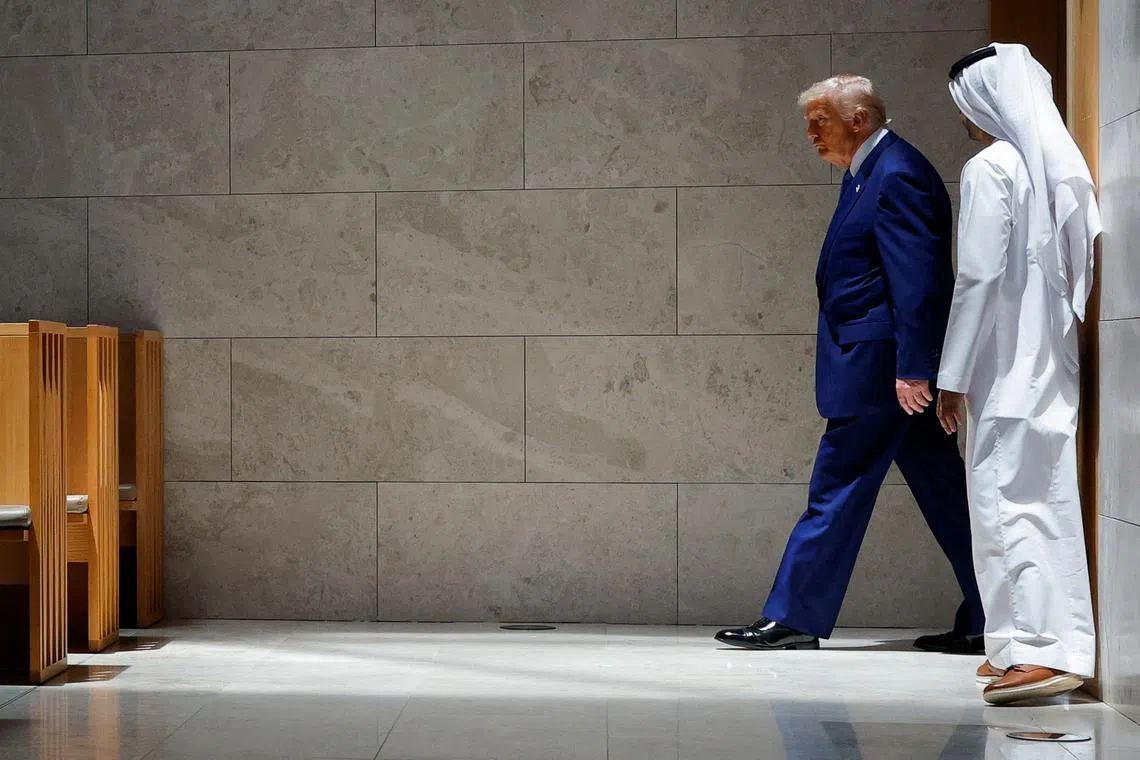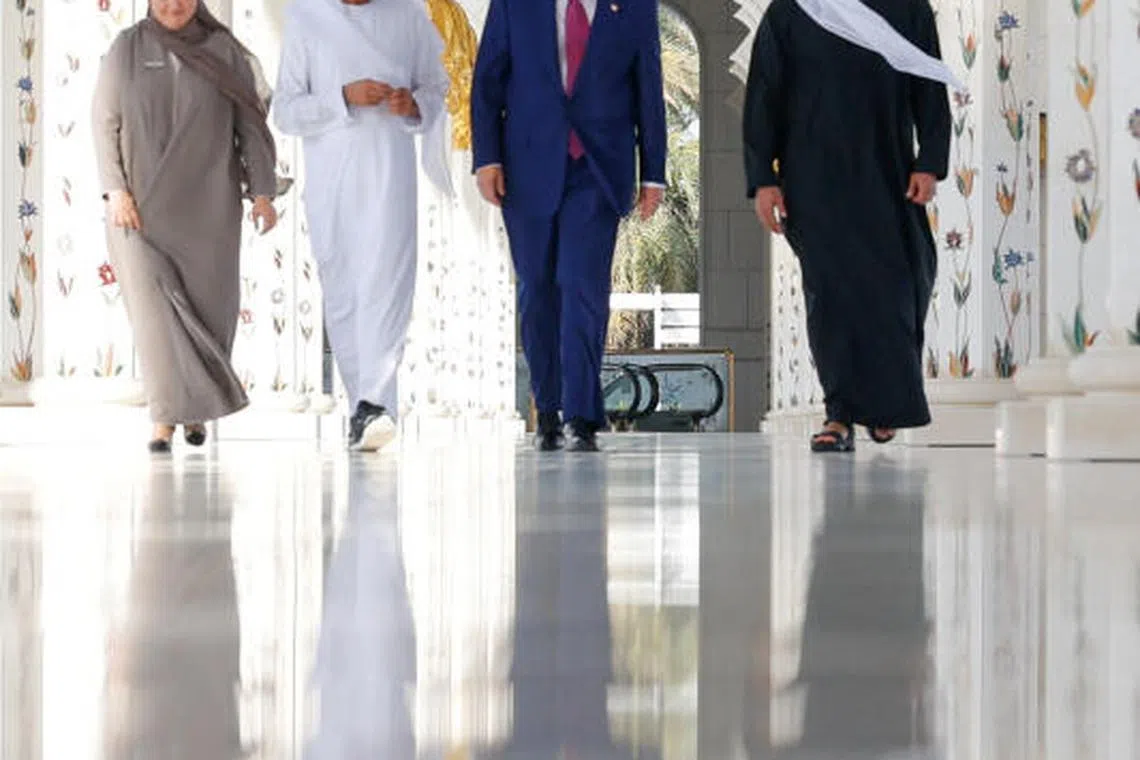Gulf states use opulence and flattery to win Trump’s heart
Sign up now: Get ST's newsletters delivered to your inbox

US President Donald Trump visits Moses Ben Maimon Synagogue on May 16 at the Abrahamic Family House in Abu Dhabi, United Arab Emirates.
PHOTO: REUTERS
Follow topic:
ABU DHABI - Escorts of camels and Arabian horses. A luxury plane offered as a gift. Hundreds of men dancing with drums and scimitars before marble palaces.
Extravagant displays of opulence and adulation greeted US President Donald Trump at every stage of his four-day swing through the Gulf, which wrapped up on May 16.
His itineraries in Saudi Arabia, Qatar and the United Arab Emirates appeared tailor-made for a real estate developer-turned-president, who can be susceptible to flattery, transactional in his foreign policy dealings and is attracted to extreme wealth.
To the extent those displays were designed to curry favour with Mr Trump, they very well might have worked. While the Gulf states announced trillions in potential investments in the US during his visit, they also got plenty in return.
On May 15, the US agreed to partner with the UAE to build a massive artificial intelligence campus recommended against rapprochement
“Oh, what I do for the Crown Prince!” the President gushed to the crowd at the investment conference in Riyadh where he announced the decision.
Mr Trump’s regional swing could serve as a template for other host nations looking for a way to the President’s heart, analysts said. The treatment Mr Trump received throughout the week seemed almost a global extension of what regularly plays out in Washington, where Cabinet members are quick to praise Mr Trump’s acumen and vision, and often outline the administration’s accomplishments in superlative terms.
“They played their hand well,” Ms Laura Blumenfeld, Middle East analyst at Johns Hopkins University’s School of International Studies in Washington, said of the Gulf state leaders. “The choreography of Trump’s royal tour was impressive.”
Mr Trump left the Middle East without securing a ceasefire or renewal of humanitarian aid for Gaza, however. Democrats and good government watchdogs raised concerns about Mr Trump’s decision-making being swayed by the regal spectacle and whether his diplomatic efforts could be used to further his family’s extensive business operations in the Arabian Peninsula.
“It feels like Trump is being played by some of these leaders with the ostentatious, ceremonial pomp,” said Mr Brett Bruen, a former foreign policy adviser to then Democratic President Barack Obama and president of the Global Situation Room consultancy.
“A lot of this raises questions whether Trump is taking personal prizes or really advancing US interests in the region,” he added.
The Trump administration has repeatedly said it is committed to transparency and that it complies with all ethics laws to avoid conflicts of interests.
“Countries in the Middle East are ‘pulling out all the stops’ because America is strong again,” said Mr Taylor Rogers, a White House spokesman. “Foreign leaders know President Trump is the dealmaker-in-chief whose ‘peace through strength’ policies have restored America’s dominance.”
Royal treatment
The pomp and pageantry began before Mr Trump even touched down in Saudi Arabia on May 13 for the first stop of his trip.
As Air Force One descended towards Riyadh, Saudi F-15 fighter jets appeared close alongside to escort the presidential plane. After the President walked down a lavender carpet, his motorcade was escorted to the Royal Court on a road lined by mounted Arabian horses.
Not to be outdone, Qatar gave Air Force One a fighter jet escort of its own as it descended into Doha on May 14. And instead of mere horses, the Qataris added camels into the mix, as well as Tesla Cybertrucks, which have become popular among some Trump supporters due to their affiliation with Tesla chief executive Elon Musk, a close Trump adviser. A traditional dhow sailboat with an American flag sail bobbed in the nearby bay.
In Qatar’s elaborate royal court, the Emiri Diwan, Mr Trump gushed at the quality of the marble. Mr Trump’s own style tends heavily toward the white stone and gold leafing, elements that feature heavily at his Mar-a-Lago estate in Florida and which he has added to the White House since taking office.
The emir had previously offered Mr Trump a luxury Boeing 747-8 plane
“We are very excited,” the emir said. “I know that you are a man of peace. I know that you want to bring peace to this region.”

US President Donald Trump touring the Sheikh Zayed Grand Mosque in Abu Dhabi on May 15 with the mosque’s director and other officials.
PHOTO: REUTERS
Mr Trump, throughout the trip, was quick to offer compliments in return. "I like him a lot. I like him too much," Mr Trump said of Prince Mohammed, without mentioning the leader's alleged role in ordering the murder of US-based Saudi journalist Jamal Khashoggi
UAE President Mohamed bin Zayed al Nahyan, Mr Trump said later in the week, is a "magnificent man".
Upon landing in Abu Dhabi on May 15 for the last stop of his trip, Mr Trump toured the massive, ornate Sheikh Zayed Grand Mosque with the emirate's crown prince. Mr Trump marvelled at its beauty and what he called "an incredible culture."
At the Qasr Al Watan royal palace that evening, Sheikh Mohamed presented Mr Trump with a final gift on his trip: the Order of Zayed.
The baroque pendant necklace, the country's highest civilian honour, is made of pure gold. REUTERS

